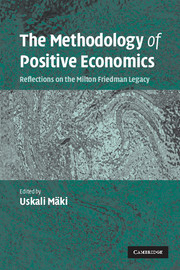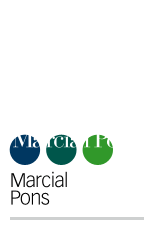The methodology of positive economics
reflections on the Milton Friedman legacy
- ISBN: 9780521686860
- Editorial: Cambridge University Press
- Fecha de la edición: 2009
- Lugar de la edición: Cambridge. Reino Unido
- Encuadernación: Rústica
- Medidas: 23 cm
- Nº Pág.: 351
- Idiomas: Inglés

Ed. Uskali Mäki. Milton Friedman's 1953 essay 'The methodology of positive economics' remains the most cited, influential, and controversial piece of methodological writing in twentieth-century economics. Since its appearance, the essay has shaped the image of economics as a scientific discipline, both within and outside of the academy. At the same time, there has been an ongoing controversy over the proper interpretation and normative evaluation of the essay. Perceptions have been sharply divided, with some viewing economics as a scientific success thanks to its adherence to Friedman's principles, others taking it as a failure for the same reason. In this book, a team of world-renowned experts in the methodology of economics cast new light on Friedman's methodological arguments and practices from a variety of perspectives. It provides the 21st century reader with an invaluable assessment of the impact and contemporary significance of Friedman's seminal work.
Part I. The Classical Essay in 20th Century Economic Methodology: The methodology of positive economics (1953) Milton Friedman
Part II. Reading and Writing a Classic:
1. Reading the methodological essay in twentieth century economics: map of multiple perspectives Uskali Mäki
2. Early drafts of Friedman's methodology essay J. Daniel Hammond
3. Unrealistic assumptions and unnecessary confusions: rereading and rewriting F53 as a realist statement Uskali Mäki
Part III. Models, Assumptions, Predictions, Evidence:
4. The influence of Friedman's methodological essay on economics Tom Mayer
5. Did Milton Friedman's methodology license the formalist revolution? D. Wade Hands
6. Appraisal of evidence in economic methodology Melvin Reder
7. The politics of positivism: disinterested predictions from interested agents David Teira Serrano and Jesús Zamora Bonilla
Part IV. Theoretical Context: Firm, Money, Expected Utility, Walras and Marshall:
8. Friedman's 1953 essay and the marginalist controversy Roger Backhouse
9. Friedman (1953) in relation to theories of the firm Oliver Williamson
10. Friedman's selection argument revisited Jack Vromen
11. Expected utility and Friedman's risky methodology Chris Starmer
12. Friedman's methodological stance: causal realism Kevin D. Hoover
13. On the right side for the wrong reason: Friedman on the Marshall-Walras divide Michel De Vroey
Part V. Concluding Perspectives:
14. The debate over F53 after 50 years Mark Blaug
15. Final word Milton Friedman
References
Index.
Ed. Uskali Mäki







